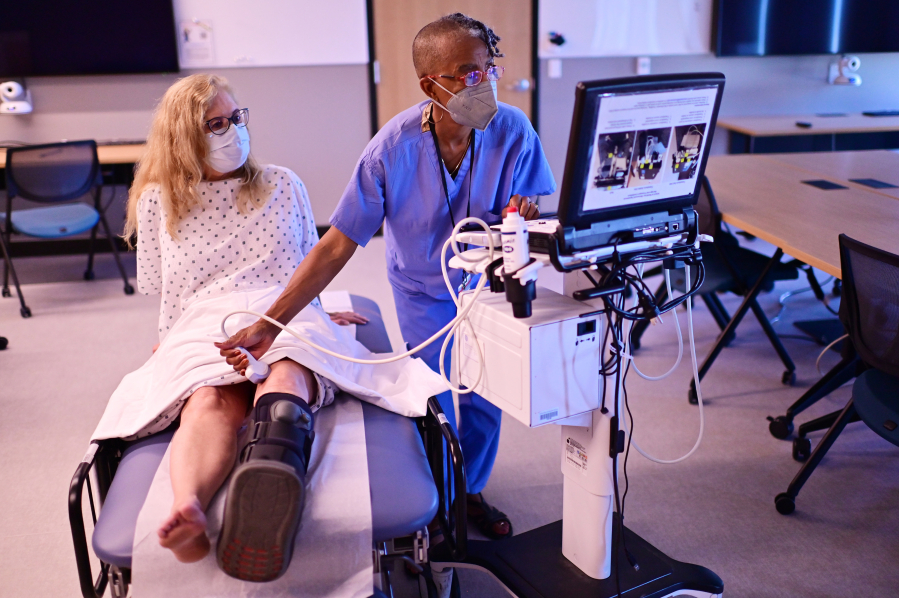DENVER — Christina Cass has spent the last 25 years of her career in and out of hospital gowns. She’s been poked and prodded, diagnosed with dozens of different ailments from lung cancer to Alzheimer’s disease, and treated for her knee and for injuries after a car accident.
Tomorrow, she’ll happily do it again.
That’s because Cass is actually in good health. The hospital rooms and exam tables are just mockups in a simulation center. And the “doctors” coming to visit her are medical students who know that Cass is actually the one who is doing the analysis, helping to assess their words and actions for the duration of the “exam.”
Cass is a standardized patient. Her job is to memorize scripts and act out a wide range of different scenarios to allow medical students to apply bedside manner skills they’ve learned in the classroom in a realistic medical setting. There are currently 81 standardized patients — or SPs, as they’re referred to — employed part-time at the University of Colorado Anschutz Medical Campus, home to Colorado’s largest SP program.
SPs make $32.50 an hour by letting students peer inside their ears, listen to their heart and lungs, assess their mental health, and gather information about their “symptoms.” Afterward, the SPs give feedback to help students develop communication skills, express empathy and build rapport with future patients.
Both of Colorado’s medical schools, CU Anschutz in Aurora and Rocky Vista University in Parker, use live actors to teach their students.
Both programs share many of the same SPs. Both campuses also use electronic mannequins and dummies to simulate emergency treatments and invasive procedures such as surgery, but working with real people helps students learn skills that a mannequin typically can’t teach. A live actor is trained to give feedback about how the student made them feel emotionally and physically.
Cass started working just a year after CU Anschutz’s SP program became formally recognized in 1998. Formerly an actress, she’d found out about the opportunity during an acting class.
“I applied and trained for it and I thought it was the coolest thing,” she said.
Today, Cass conducts training and does mostly stand-in work when other SPs can’t attend the simulated sessions. Having been with the program for nearly 25 years, she’s seen its growth through numerous ups and downs — including the COVID-19 pandemic.
When the public health disaster shut the world down in March 2020, she watched as the SP program prepared to deal with the seemingly impossible reality: teaching the next generation of health professionals purely online.
“I was literally panicked,” she recalled.
Neither SP program halted. On the Monday after CU Anschutz’s shutdown on March 13, 2020, medical students fired up their laptops and met their SPs online for “telehealth visits.” The switch took some quick thinking from tech team members and program coordinators, such as CU Anschutz’s Center for Advancing Professional Excellence director Shimaa Basha and Simulation Education Project coordinator Tanya Russell.
“Converting (sessions) to a virtual conversation took a lot of creative energy … to put it together and not jeopardize the session outcomes or what the students can get out of it,” Basha said.
At RVU, the program turned more to its mannequins and a virtual-reality patient experience early in the pandemic, when live patients were more challenging to host safely. The VR simulation, a program called Oxford Medical Simulation introduced to RVU in 2019, provided much of what a live actor could — automatic reactions and detailed feedback — but in a completely virtual setting.
“We were really happy that we had sort of moved over to this anyway, so we reacted (to the pandemic) pretty quickly,” said Susan Carter, executive director of RVU’s Office of Simulation in Medicine and Surgery.
Some pandemic changes have stuck around. SPs are often trained virtually at CU Anschutz. Telehealth visits, also implemented at RVU, are now part of the institution’s regular curriculum.



